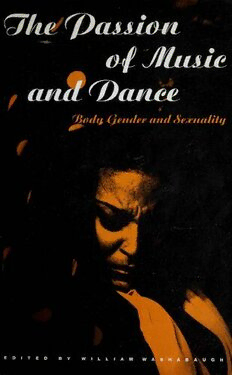
The passion of music and dance: Body, gender, and sexuality PDF
Preview The passion of music and dance: Body, gender, and sexuality
The Passion of Music , anf Dance Bots Gender ae Sexuality The Passion of Music and Dance The Passion of Music and Dance Body, Gender and Sexuality Edited by William Washabaugh Oxford * New York First published in 1998 by Berg Editorial offices: 150 Cowley Road, Oxford, OX4 1JJ, UK 70 Washington Square South, New York, NY 10012, USA © William Washabaugh 1998 All rights reserved. No part of this publication may be reproduced in any form or by any means without the written permission of Berg. Berg is the imprint of Oxford International Publishers Ltd. Library of Congress Cataloging-in-Publication Data A catalogue record for this book is available from the Library of Congress British Library Cataloguing-in-Publication Date A catalogue record for this book is available from the British Library ISBN 1 85973 904 0 (Cloth) 1 85973 909 1 (Paper) Typeset by JS Typesetting, Wellingborough, Northants. Printed in the United Kingdom by WBC Book Manufacturers, Mid-Glamorgan. Contents Acknowledgements Vil Notes on Contributors 1 Introduction: Music, Dance, and the Politics of Passion William Washabaugh Flamenco Song: Clean and Dirty William Washabaugh 27 Fashioning Masculinity in Flamenco Dance William Washabaugh 39 Gendering the Authentic in Spanish Flamenco Timothy deWaal Malefyt 5 | Carlos Gardel and the Argentine Tango: The Lyric of Social Irresponsibility and Male Inadequacy Donald Castro Tango and the Scandal of Homosocial Desire Jeffrey Tobin 79 From Wallflowers to Femmes Fatales: Tango and the Performance of Passionate Femininity Marta E. Savigliano Rebetika: The Double-descended Deep Songs of Greece Gail Holst-Warhaft 111 The Tsifte-teli Sermon: Identity, Theology, and Gender in Rebetika Angela Shand 127 Contents 10 Passionless Dancing and Passionate Reform: Respectability, Modernism, and the Social Dancing of Irene and Vernon Castle Susan C. Cook 133 11 Social Theory and the Comparative History of Flamenco, Tango, and Rebetika Gerhard Steingress 151 References 173 Index 189 _yji-— Acknowledgements This collection of essays in comparative social history grew out of the papers that were presented at the 1996 meeting of the American Anthro- pological Association in a session entitled “The Politics of Passion.’ The idea for this exploration of the politics and ideology in flamenco, tango and other popular styles had occurred to me a number of years earlier, but my discussions with Gerhard Steingress in 1994 and 1995 helped to advance it by leaps and bounds — Gerhard’s Sociologia del Cante Flamenco (1993) ends with a discussion of flamenco, tango, rebetika, and csardas. This present collection of essays, written by some of the world’s most knowledgeable students of flamenco, tango, rebetika, and North American popular music, makes giant strides forward in our quest to understand the complex interweaving of gender, politics, music, and dance in modern life while simultaneously opening the way for future explorations of these phenomena. The essays by Donald Castro, Gail Holst-Warhaft, Timothy de Waal Malefyt, Marta Savigliano, Jeffrey Tobin, and Susan Cook are revisions of the presentations they made at the San Francisco meeting. Gerhard Steingress, Angela Shand and I were involved in the organization of the session from its inception. Angela and I assisted at the presentations, participated in subsequent discussions, and contributed our editorial efforts to the present volume. Discussions with David Monroe enhanced my own essays. My wife Catherine talked me through a great number of intellectual and organizational knots. I thank all these people, but especially Catherine, for their participation in this project. W. Washabaugh —Vli-
